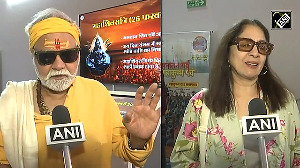There is a distinctive downside to the dialogue process. It has not succeeded in arresting the terrorism campaign against India, says A K Verma.
A dialogue at the foreign minister's level is scheduled between India and Pakistan towards the end of the month. This will not be a unique event since several other dialogue fora have been continuously active over a long span of time.
The Neemrana Dialogue (track-two diplomacy) between the self appointed intellectuals has been going on for more than 20 years. Various think tanks with funding from foreign sources are at it fairly regularly at diverse external locations. There are other civil society groups engaged in similar activity.
In addition, there have been officially inspired track II discussions. The forthcoming track I exchange between the two foreign ministers will be the latest one in an official series in which the heads of two governments have also been participating. However, in terms of real progress between the two countries, the outcomes are nothing much to talk about. The process itself remained objectively a sterile exercise, not withstanding some minor achievements which are vaingloriously labelled 'confidence building measures'. The reasons for such continuous failure are not difficult to fathom but the dialogues are kept going simply in the hope that a more fruitful dawn may miraculously arrive.
There are fundamental differences in the perspectives of the two countries which rule out substantive progress. India looks at Pakistan through the prism of geography and territory, whereas, for Pakistan the problems with India are rooted in the mists of ideology. A meeting ground is, therefore, difficult to attain.
At the heart of Pakistan's posture is the two-nation theory which claimed that the Muslims and Hindus of India constituted two different nations. Although the Indian leaders of pre-partition vintage considered this theory to be spurious, they acquiesced to Pakistan's creation in 1947 on this basis.
This theory has compelled Pakistan continuously to deny the Hindu and Buddhist traditions of common culture of the sub-continent and to project non existing Arab underpinnings as the heritage of Pakistan. The idea of Pakistan has been nurtured through such denial.
Over the decades Pakistan has been in existence, Hindus have been systematically driven out and its Islam widely Saudiised and Wahabised. The traumatising experiences of partition, resulting in the killing of hundreds of thousands, etched deeply in the Pakistani psyche, also contributes in the defining of Pakistan. That country will not accept any solutions to its problems with India which do not fit in its ideological framework or run counter to its two-nation theory.
Therefore, Pakistan's deadly confrontation with India has become an abiding reality. Kashmir alone is not its cause. Solutions lie well beyond the capacity of any dialogue.
For the same reasons there can be no end to the proxy war or the state policy of terrorism directed from across the border. In a sense, the US also bears the brunt of this terrorism as Pakistan will not offer whole hearted collaboration to the US in the latter's war against terrorism.
Pakistan has steadily built up its Islamic credentials which are creeping towards extremist manifestations. Its educational systems, official and non-official, at the school and college levels, promote this transformation and have created a civil society which harbours a heavy resentment against India.
All madarssa institutions without any exceptions have become powerful agents in the growth of such a mindset. Many public polls carried out in Pakistan by independent organisations have brought out the fact that a vast majority of the common people of Pakistan, both in rural and urban sectors, regard India as the number one enemy of the state.
Only recently, US policies about Pakistan and Afghanistan have shifted the focus away from India towards itself. This is however a transient development and the dubious distinction of being enemy number one in the public mind will revert back to India once the US modifies its policies after its projected large-scale withdrawal from Afghanistan.
Another significant contributory factor is the absence of a defining national identity in Pakistan. The gap is filled up artificially by building up an identity through confrontation with India. This make believe process wounds Pakistan in multiple ways but the irony is that it holds India to blame for its wounds.
Those who engage in track II or civil society dialogues with Pakistan largely interact with their opposite numbers and broadly their interlocutors remain the same individuals at successive sessions. Very rarely they have access to what actually constitutes the civil society in Pakistan, i.e. students, labour activists, professionals from different sectors, teachers, farmers; religious, political and sectarian workers, and leaders from the grass-roots.
The assessment received from such civil service groups are heavily out of tune with the ground realities. Views such as those of the former Pakistan Chief of Army Staff General Jehangir Karamat that war alone could bring a solution to India-Pakistan problems, are rarely, if ever, reflected. Pakistani intentions about their nuclear arsenal have remained largely clouded as government dialogues ensure no access to serving military personnel of Pakistan who control this arsenal and decide policy about its uses.
Pakistan adheres to the policy of first use and has sometimes been found to be restless to implement it. The Indian policy of no first use is predicated on the existence of an alternate leadership that can authorise an effective second strike. There is no way of judging whether this is a dependable option.
Starting a new channel of dialogue through the intelligence chiefs of the two countries, as some have suggested recently, is unlikely to be helpful either. There is a history of contact between intelligence chiefs in the past but this contact was subsequently brazenly denied by the successors to those who had initiated the path-breaking dialogue. There is nothing to indicate a change of heart.
The way forward can open up if Pakistan abandons the two nation theory. Some in Pakistan, like the Muttahida Quami Movement, have discarded it but not the leadership in authority. Until that happens, dialogues will remain a sterile exercise and bitterness against India will not disappear.
There is a distinctive downside to the dialogue process. It has not succeeded in arresting the terrorism campaign against India. There was a time when it was happily believed that Al Qaeda was not targeting India and that indigenous elements were immune from its virus. That myth now stands blown out.
The danger is not Al Qaeda but its ideology which no longer needs an Osama bin Laden or Al-Zawahiri to grow to new heights. The sights are now well set on India. The protagonists of the dialogue process need to reflect how the enlarged threats can be combated, at the ground as well as in the philosophical spheres. That such currents should cross into India is a fervent hope and cherished dream of Pakistan.
A K Verma is a former chief of Research and Analysis Wing







 © 2025
© 2025